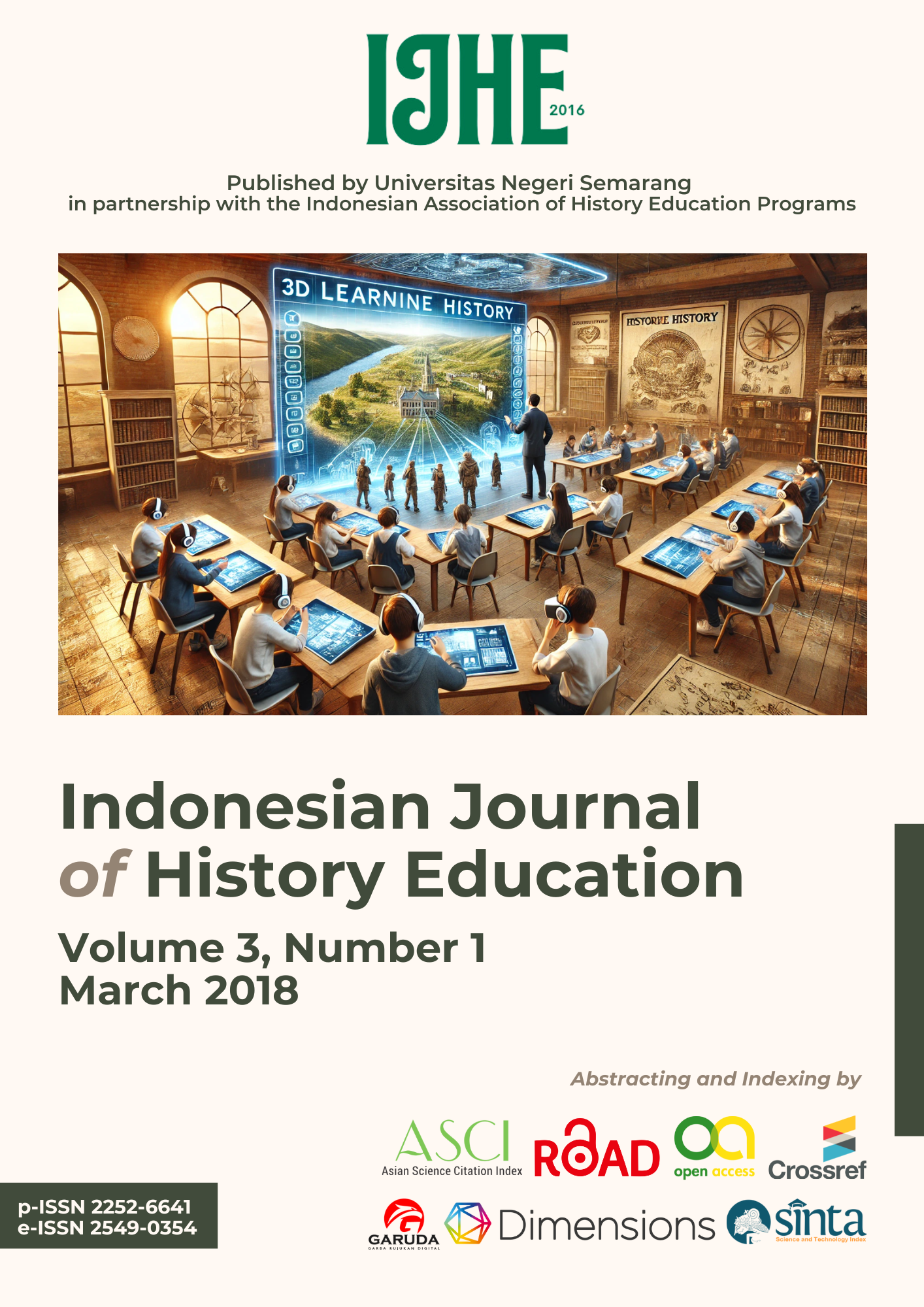Implementation of Scientific Approach in the 2013 Curriculum on History Learning
Abstract
The District Education Office Trunk designated several schools, including SMA 2, to implement the 2013 curriculum, with this study focusing on two main aspects: the implementation of Curriculum 2013 in teaching history in schools, and the methods used to incorporate a scientific approach to history education. The research aimed to provide comprehensive insights into how the Curriculum 2013 was applied within the educational framework of history classes, examining both the effectiveness and practical aspects of this integration. Specifically, the study sought to understand how the curriculum's principles were translated into teaching practices, evaluating the impact on both teaching methods and student comprehension. Additionally, the research explored the incorporation of a scientific approach to history education, assessing its influence on pedagogical strategies and the depth of student learning. The overarching goal was to evaluate the overall execution and outcomes of these educational strategies, offering a detailed understanding of the curriculum's application and the efficacy of the scientific approach in enhancing history education. Through in-depth analysis, the study aimed to contribute to a broader understanding of the practical challenges and successes in implementing the 2013 curriculum, providing valuable insights for educators and policymakers aiming to improve history education through innovative and scientifically-grounded methods.
References
Burhanudin, J. (2017). Islam in the flow of Indonesian history. Prenada Media.
Daryanto. (2010). Pendekatan pembelajaran saintifik. Gava Media.
Dzulhaq, M. I., Tullah, R., & Nugraha, P. S. (2017). Academic Information System for Curriculum-Based Schools 2013. Journal of Global Sisfotek, 7(1).
Hilda, L. (2015). Scientific approach to the learning process (curriculum review 2013). Journal of Darul 'Ilmi Vol, 3(01).
Jannah, L. M., & Prasetyo, B. (2011). Quantitative approach. Subject Matter Quantitative Research Methods, 1-19.
Jihad, M. (2010). Definition of Curriculum. Available on http://jihadada.blogspot.com/p/pengertian-kurikulum-menurut-para-ahli.html. Accessed on, p. 15.
Kartika, I. M. (2010). Definition of Curriculum Roles and Functions. FKIP Dwijendra University Denpasar, nd, 1-7.
Kuntarti, R. (2014). Implications of Changes in the Educational Curriculum in the Cadet Education System on the Achievement of Cadet Quality to Support Unit Resilience (Study at the Military Academy, Magelang, Central Java). Journal of National Resilience, 20(1), 67–80.
Kurniasih, I., & Sani, B. (2014). Implementation of the 2013 Curriculum Concept and Application. Said Pena.
Lubis, M. (2015). The readiness of teachers as curriculum developers in responding to curriculum changes. In Proceedings of The 2nd International Multidisciplinary Conference 2016 (Vol. 1, No. 1).
Matitaputty, J. K. (2016). Learning models of controversial issues in history learning. Journal of Social Science Education, 3(2), 185-192.
Miles, M. B., & Huberman, A. M. (2009). Qualitative data analysis. UI Press.
Moleong, L. J. (2007). Qualitative Research Methodology: Revised Edition. PT Remaja Rosdakarya.
Muhammedi, M. (2016). Curriculum Changes in Indonesia: A Critical Study of Efforts to Find the Ideal Islamic Education Curriculum. Raudhah Journal, 4(1).
Mulyasa, E. (2014). Development and implementation of the 2013 curriculum. PT. Remaja Rosdakarya.
Muzamiroh, M. L. (2013). Thoroughly Peel the 2013 Curriculum. Said Pena. .
Permatasari, E. A. (2014). Implementation of scientific approach in the 2013 curriculum on history learning. Indonesian Journal of History Education, 3(1).
Poerwati, L. E,. & Amri. S. (2013). Guide to Understanding the 2013 Curriculum. PT. Putrakarya's achievements.
Prihartanta, W. (2015). General Encyclopedia (National). Adabiya Journal, 5(85), 1-14.
Surasmi, W. A. (2013). Application of scientific approach in the learning process of the 2013 curriculum. Gospodarka Materiałowa i Logistyka, 26(4), 185-197.
Suyadi, P. (2013). Strategi Pembelajaran Pendidikan Karakter. Yogyakarta: Pustaka Pelajar.
Vlekke, B. H. M. (2008). Nusantara: History of Indonesia. Gramedia Popular Literature.
Wirianto, D. (2014). Historical perspective of curriculum transformation in Indonesia. Islamic Studies Journal, 2(1).
Yudiono, K. S. (2010). Introduction to the history of Indonesian literature. Grasindo.
Copyright (c) 2018 Eka Aprilia Permatasari

This work is licensed under a Creative Commons Attribution 4.0 International License.
Copyright Notice
An author who publishes in the Jurnal Indonesian Journal of History Education agrees to the following terms:
- Author retains the copyright and grants the journal the right of first publication of the work simultaneously licensed under the Creative Commons Attribution-ShareAlike 4.0 License that allows others to share the work with an acknowledgement of the work's authorship and initial publication in this journal
- Author is able to enter into separate, additional contractual arrangements for the non-exclusive distribution of the journal's published version of the work (e.g., post it to an institutional repository or publish it in a book) with the acknowledgement of its initial publication in this journal.
- Author is permitted and encouraged to post his/her work online (e.g., in institutional repositories or on their website) prior to and during the submission process, as it can lead to productive exchanges, as well as earlier and greater citation of the published work (See The Effect of Open Access).
Read more about the Creative Commons Attribution-ShareAlike 4.0 Licence here: https://creativecommons.org/licenses/by-sa/4.0/.




